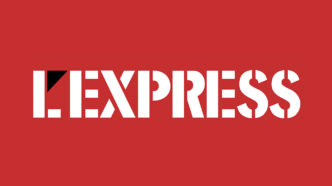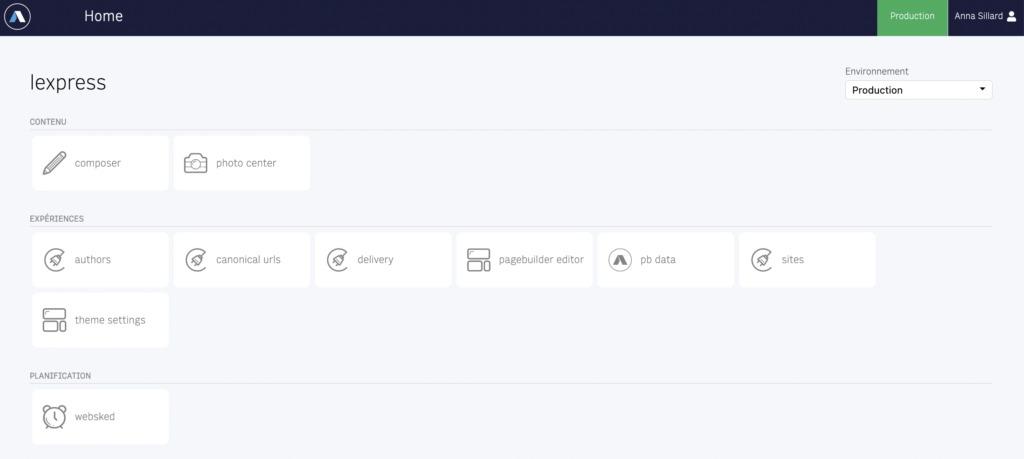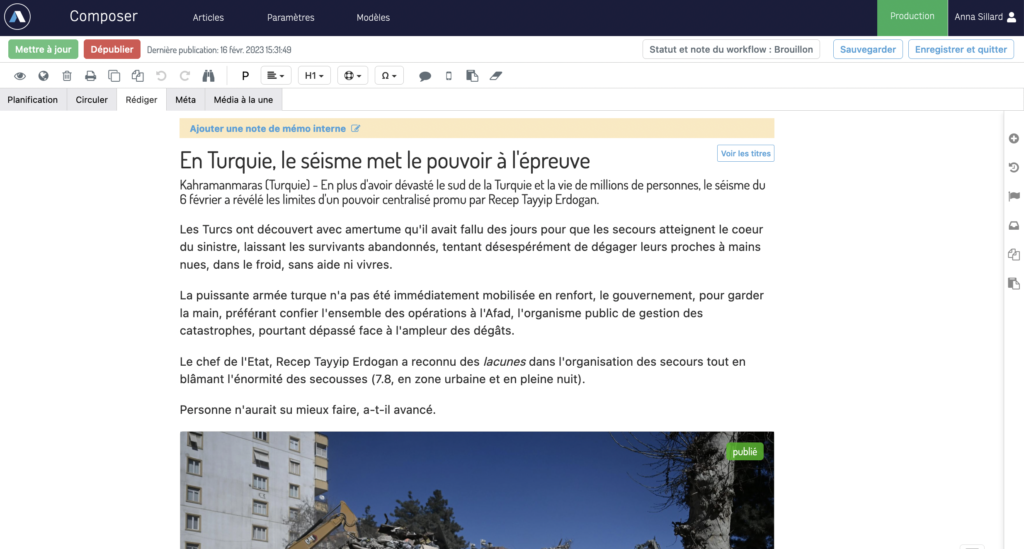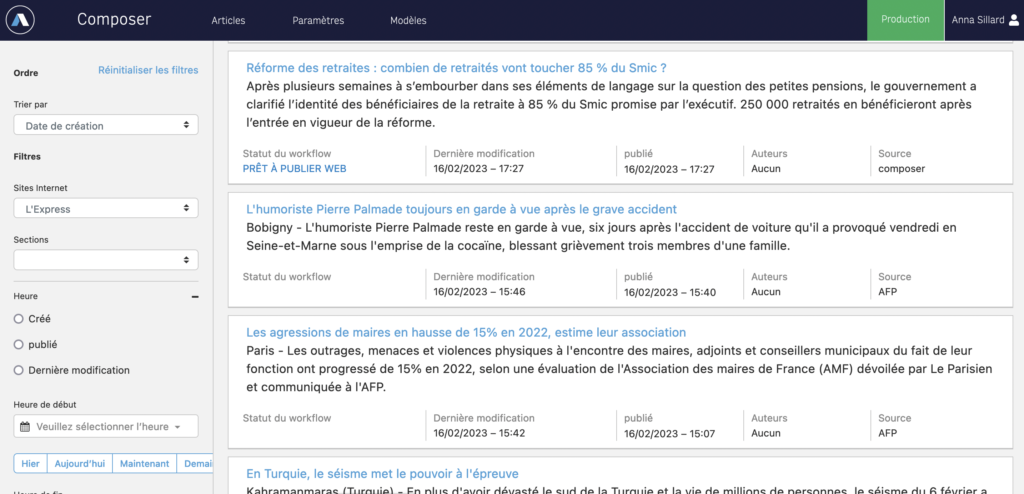

When the weekly, French newspaper L'Express left Altice group in 2020, all its plans for a new content publishing tool fell through. The in-house CMS was obsolete, no developer knew how to work on it anymore and the title was falling behind. Switching tools became vital for survival. We interviewed Anna Sillard, Product Director at L'Express, who discussed how they chose the American solution, Arc XP, how it was implemented and how 1.2 million articles were moved across, without a trace.
What is the context of the Express today?

Back in 2020, L’Express left the Altice group… and it’s only just now that we’re coming out the other side of a 360° tech migration!
When we were still with Altice, publishers in the group were moving towards a shared tech stack. So when we split, we had some serious decisions to make about tools – which ones would we keep, which would need developing and which SaaS tools would we outsource?
For example, we decided to switch from an in-house CRM to Selligent. And on the advertising side, we abandoned our own ad-server and switched to Prisma’s server in July 2022.
As for our CMS, we used ‘Ocari’ at the time – an in-house CMS developed by the L’Express teams in 2012/13. However, Ocari was in Symfony 1, a technology that’s totally obsolete today and one that’s almost unknown to developers on the market, so it was very difficult to recruit. Given this, and our planned shared tech stack with Altice group, we were going to abandon Ocari and migrate to a group CMS called Cléo, one that would serve BFM, Libération and L’Express. Cléo was a modern copy of Ocari but in React.
So, since 2018, L’Express’ Ocari was completely dormant, with no further developments, meaning that basic things, like search engines in apps, was impossible. Our CMS wasn’t able to manage queries based on content, tag pages with a theme… things that are essential today. But we took our pain in patience as we had Cléo in our sights… and then we left the Altice group. Cléo wasn’t going to happen anymore and we had to (very urgently) ask ourselves the question of what CMS we would use.
How did you choose Arc XP?
Our colleagues from Libération, who were more advanced than us on the migration to Cléo, were also interrupted mid-flight. Their team very quickly made the choice to switch to Arc XP. And Le Parisien had also done so before them.
In this context, choosing Arc made sense, but we wanted to look seriously at 3 solutions:
- Eidos, but the tool seemed to be aging. We didn’t think that we were going towards the future by taking Eidos, especially in terms of web to print.
- Sirius, Le Monde’s CMS, but we would have been the group’s first external client, which scared us a little.
- And of course Arc XP.
Our main challenge was to find a CMS that managed digital publishing but was also the entry point for all editorial teams (including print) to write all our content that are then sent to all platforms (website, app, print – we use XMS from 4D Concept). And then of course the whole universe of content distribution channels – Google showcase, newsletters…

How did the project develop?
From the start, we identified two problems:
- Working in English on complicated subjects
- Working with a time difference with the United States, which meant meetings that ended late…
But, unlike Libération and Le Parisien, who suffered from working directly with American teams, we were their first French client to work with an integrator in our language. We worked with code.store, which is a French agency that employs developers based in Eastern Europe, Russia and Ukraine. But our project manager, Lucas Baron, (who was amazing by the way) is French. He was the one who interfaced with Arc’s American teams.
So we, the L’Express team, never spoke to Arc during the set-up year. It’s only since the launch of the site, in December 2022, that code.store let go of our hands and left us to be in direct contact with Arc. This way of working has been very, very comfortable.
What has this meant in terms of cost?
Of course, it’s L’Express that takes care of the code.store integrator costs.
On the Arc side, we paid for a 9-month license with limited billing, at a very low rate, during the installation. My advice: be careful when signing the contract to think about the migration period because, by default, Arc offers a 6-month reduced rate for integration. After 6 months, the publisher must pay full price. We’d negotiated 9 months but, even then, we still had to renegotiate afterwards!
After that, billing is based on the server size and on the number of bricks used. For example, the “Composer” brick is where we write articles, it’s the foundation. Then we also used “Page Builder” for the homepage, the section pages, etc…
So we paid code.store on top of this cost, but we don’t have any third-party maintenance because we’ve completely taken over our developments.
Who worked on this CMS migration project internally?
There were three of us working on the L’Express side: our CTO, Olivier Lajeunesse, Marketing Director Emilie Ruaux and me as Product Director and operational pilot for this project as the one who knew Ocari best. None of our developers worked on the project during the 2022 set-up year, but we brought them back in near the end for the handover between code.store and us.
We were accompanied by Virginie Clève to manage SEO challenges, something that proved very valuable given that she had worked on a migration before and knew the subtleties of the pages delivered by Arc. In particular, there were parts of our content that needed to be reworked to be adequately optimized for SEO…

How do you benefit from Arc platform’s developments and updates?
As far as updates are concerned, we have a global roadmap, so any requests for an upgrade go through a worldwide study. We’ve therefore returned to a slow evolution schedule – for instance we know that Arc is currently working on real-time live video, which is a problem that does not interest us.
But, on the European side, we have coordinated with Le Parisien, Libération and 2 Belgian titles to meet every quarter and exchange on any Arc issues, compare the answers we get from respective Customer Success Managers, and discuss shared evolution requests. This was originally a Libération/Le Parisien initiative that we joined.
This has been a very mutually beneficial aid for us, allowing us to challenge any answers that Arc can give us. For example, in terms of redirections, Arc doesn’t manage 301s very well by default, instead proposing 302s. To solve this, Libération was able to give us a piece of code to correct it!
What did you manage internally at L’Express?
We had to redo 100% of the front end, but we decided not to change the layout, saving ourselves the planning risk, especially in terms of validation. Our pages were barely 2 years old, they were still suitable, so we took them as they were.
Also, our choice for a SaaS tech stack isn’t 100% respected – we still have a small, locally hosted layer which manages sending newsletters and our audio content. So we had to develop a small brick on our side, one that allows us to manage what Arc does not.
What didn’t you do during this redesign, and what are the evolutions to come?
For this redesign, as I was saying, we stayed within the template, so there are features that exist in Arc that we didn’t use because we didn’t have them on the front end:
- Tag pages, Author pages…
- Long formats, and the implementation of videos
We also didn’t want to change the way our editorial staff work. In theory, with its WebSked brick, Arc would allow us to develop the way we distribute content by letting journalists put forward content for X newsletter or X featured article… it’s a whole workflow logic and collaboration in Arc which is very advanced. But, for now, we’ve kept to a very simple implementation.
There’s also all the work around the article ‘shell’ that we currently fill through metadata (the character count, illustration management, etc.) that we’re yet to use to the maximum.

What has this migration changed for you?
In terms of time, it’s much faster to get a project out with Arc. For example, a few weeks ago we launched our open house, which involved some small changes like the CTA in the header, adding a banner to the footer, etc. With Arc, we managed to update these elements in 1000 times less time than before.
On the other hand, there’s a limitation at Arc that we’ve had to adapt to in terms of development. Specifically, on our old Ocari CMS, we could pull as many branches as there were features in development. On Arc, we have only one preprod interface, so we can’t test 3 features that would have been developed on 3 different branches – one test drives out the other. We therefore have to pace ourselves to test projects one after the other.
However, Le Parisien is currently speaking to Arc about having 3 instances, one for each business team (subscription, editorial, monetization) meaning they would have 3 preprod.
Did you take advantage of this migration to advance other projects?
Yes, we did a lot of housekeeping! We did a huge cleanup of our image database, notably by deleting hundreds of thousands of photos, some of which we no longer had the rights to due to various contracts that had ended.
The same goes for our content base – we deleted old Reuters stories that we could no longer have online.
And we also deleted a lot of smaller content that had no value for Google. In fact, we removed all articles that were less than 800 characters long.
What was the most difficult part of this migration?
Clearly, the redirection part was the most difficult to manage. When we did a general inspection of what was running on the server side, we discovered 800,000 unitary redirects hidden under the carpet! We really had to limit this knowing that Arc limits the number of 301 redirects to 100. Yes, 100!
Le Parisien helped us a lot on this issue, we were able to manage redirects through an API. But when we discovered this maximum of 100 redirects with Arc, we were certainly a little stressed!
And then, after the launch, we discovered another 200,000 redirects that had not been managed during the project… Obviously, we were unable to check everything we were doing.
In the end, we migrated 1.2 million items. We didn’t import 200,000 articles, 125,000 of which were under 800 characters.
How did the editorial staff take to the new tool?
Our editorial team is very happy and their adaptation to the tool has been brilliant.
I was expecting to have to organize a two-week training course, workshops, and after-sales services for weeks, but no! We teamed up with a pilot journalist on the editorial side and prepared a big presentation before the launch, but on the day of the launch, we had almost no requests for help or assistance. Libération had given us the same feedback: it was very simple.
There is just one thing that wasn’t managed that our technical editors would have benefited from – when an article goes to print, if there’s a correction on the layout side, then the correction does not go through to Arc. I.e. During the closing phase, information gets lost.
What a project! So, how are you doing?
I’m fine now. But in December 2022, what was hard was that we had the satisfaction of having launched the project, but it was also the moment when we discovered a lot of things that hadn’t been done properly. Google started its crawl, and we discovered a lot of subjects that needed to be managed quickly, we had to give a last push… Now it’s much better, the main challenge is over and we can start evolving again!
Would you recommend Arc to other editors?
I would say yes, even if I don’t have much experience yet.
And because I know I’ll be asked the question: do you have a communication deal with Arc?
No, I don’t!












